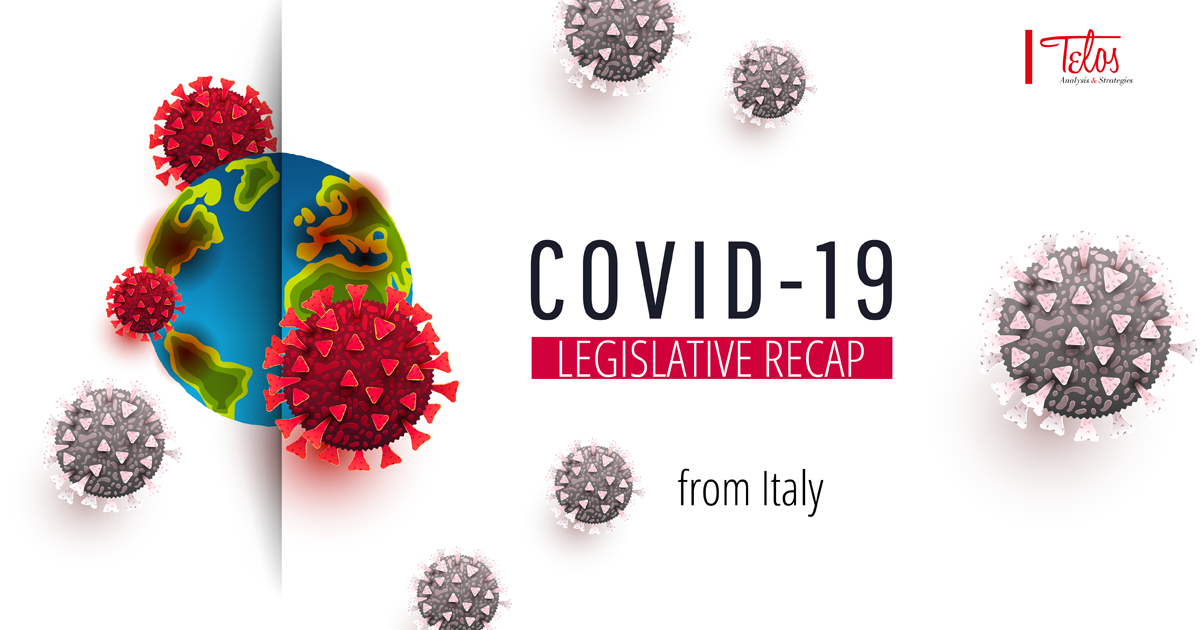Italy COVID-19 Legislative measures - The Decree-Law 16/05/2020 n.33 s.c. ‘Re-Opening’
On 15 May the Government approved the Decree-Law 16/05/2020 n.33 providing for ‘Further urgent provisions to tackle the epidemiological emergency from COVID-19’, further lifting the lockdown starting from 18 May. The Decree-Law sets up a broad legal framework for the movement of people and the resumption of economic activity, which will be complemented by a PM Decree and Regional implementing acts laying down a more detailed discipline.
You can find below a summary of its key provisions:
1. Movement of people
The Decree-Law provides that:
- Starting from 18 May, movement within each individual Region shall not be subject to any limitation, without prejudice to further restrictions in case the COVID-19 pandemic flares up again which may be imposed (in case of a new contagion spread), either by means of a Prime Minister’s Decree, or by means of a Decree of the Regional President pending the adoption of the relevant Prime Minister’s Decree. This means, in practical terms, that people may circulate freely within the Region where they live and will not be checked any longer by Police forces and asked to submit a self-declaration, stating the reasons for which they left their homes
- Until 2 June, movement across Regions remains forbidden, except for:
- proven reasons of work;
- cases of extreme urgency;
- health reasons.
- Also, until 2 June, the existing restrictions on border crossings from and into Italy will stay in force
- Starting from 3 June, movement across Regions can only be limited by a Prime Minister’s Decree imposing restrictions on certain areas according to the disease situation therein. The same goes for border crossings from and into Italy; starting from 3 June, the movement of people from and to EU member states will be free, while movement from and to other individual countries may only be restricted by a PM Decree according to the contagion spread in those countries.
- Mayors may temporarily close specific areas where public distancing cannot be otherwise ensured.
- People in quarantine who tested positive to COVID-19 or have had contacts with those who tested positive may not leave their houses under any circumstances until they recover
- Gatherings of people in open spaces or places open to the public remains forbidden.
2. Economic activity
After the above-referred discussions, the Government decided to empower Regions to set out the guidelines for the resumption of economic activities in those sectors that are still under the lockdown until 17 May, and particularly those which require specific protocols due to their peculiarities, such as bars/restaurants, hotels/other accommodation facilities, swimming pools and gyms, beach resorts, retail merchants, hairdressers, beauty salons, offices open to the public.
The Decree-Law stipulates that:
- Businesses that were still closed down may resume their activities starting from 18 May, on the condition that they comply with the protocols or guidelines adopted by the Conference of the Regions or by individual Regions, according to the general principles set out by existing national protocols. Only in the event that the Conference of the Regions or individual Regions do not adopt any protocol for a specific sector, then national protocols will apply (i.e. presumably those already drafted by INAIL, that were rejected by Regional Presidents). This is the first major change in the distribution of powers between the national Government and the Regions
- The national Government will retain the power to impose restrictions on economic activities on a national scale: restrictions may be imposed by a Prime Minister’s Decree on the proposal of the Minister of Health or the President of the Conference of the Regions or, in case the restrictions are meant to apply to certain Regions only, on the proposal of the relevant Regional Presidents. The latter will retain the power to impose restrictions, pending the adoption of the relevant Prime Minister’s Decree
- However (and this is the second major change in the distribution of powers between the two levels of Government), in case the health risk assessment conducted by the Ministry of Health shows any serious contagion threat in a Region or in a sub-regional area (according to the methodology laid down in the Decree of the Minister of Health of 30 April), it will be up to the relevant Regional President to take the ultimate decision of imposing or lifting restrictions, by simply informing the Minister of Health.
3. Sanctions
Sanctions applying to those who do not comply with the rules laid down by this Decree-Law and the relevant implementing acts will be comprised between €400 and €3,000, and will be increased by 1/3 if the violation is committed with the use of a motor vehicle. If the violation is committed by a business, the latter will also be closed down for no less than 5 days and no more than 30 days.
The Decree-Law will remain in force until 31 July 2020, when the national emergency declared in late January is scheduled to end.
The Decree-Law is now under the scrutiny of the Parliament for ratification.
If you are interested to know more please contact Telos A&S at telos@telosaes.it






SocialTelos